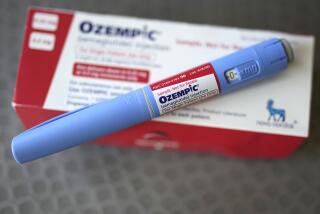McFarlane Tried Suicide, Police Believe
- Share via
WASHINGTON — Robert C. McFarlane, President Reagan’s former national security adviser and a key figure in the Administration’s Iran arms sale operation, took an overdose of 25 to 30 Valium tablets Monday morning in what police said was a suicide attempt.
The overdose occurred about three hours before McFarlane was to testify before the Tower Commission investigating the operation of the National Security Council staff in light of the arms sale scandal.
Rushed to Hospital
McFarlane, 49, was rushed by ambulance to Bethesda Naval Medical Center, minutes from his home in suburban Bethesda, Md., just after 7 a.m., according to Detective Lauren Acquaviva of the Montgomery County, Md., Police Department.
He said paramedics were called by someone at the home and were told that McFarlane had swallowed 25 to 30 tablets of the prescription tranquilizer.
“We investigate overdoses and make determinations as to the classification,” Acquaviva said. “In this particular case, we are of the opinion it was an attempted suicide.”
Motive Unknown
Acquaviva said police had not determined a motive for the episode. He said he did not know if McFarlane had left a note, and he added that a police investigation is continuing.
Lt. Vernon Sanford, a hospital spokesman, said: “His condition is good.” A McFarlane aide, John Henshaw, added: “He’s awake, under observation.”
Acquaviva said an ambulance was met on arrival at the McFarlane home by McFarlane’s wife, Jonda, and an unidentified neighbor. McFarlane was conscious and able to talk a bit, Acquaviva said, but he did not indicate why he had taken the drug.
“He made no statement as to the reason why, although there’s every indication it was an overdose,” Acquaviva said. “He did not talk--outside of indicating he had taken the Valium . . . . Mrs. McFarlane appeared to be upset but also apparently perplexed about the situation.”
Mrs. McFarlane spent the day at the hospital, a medical center spokesman said.
Some of McFarlane’s closest associates disputed the notion that he would have tried to take his own life. But one Reagan Administration official who worked closely with McFarlane--a central figure in the effort to unravel the Iran- contra affair--said the former national security adviser has “certainly been under intense pressure--personal as well as public.”
Under Strain
Another source--an associate of McFarlane--said that, as a result of the strain of the Iran scandal, “he’s obviously been operating on two cylinders.”
McFarlane was to make his second appearance Monday morning before the investigating panel headed by former Texas Sen. John Tower. The panel, appointed by President Reagan in the wake of the Iran-contra arms disclosures, is reviewing the role of the National Security Council, where McFarlane served from 1983 until his resignation in December, 1985.
McFarlane’s attorney, Leonard Garment, said no one can know at this point whether McFarlane tried to commit suicide.
“Who knew what he knew about it (the nature of Valium),” he said.
‘Strange Drug’
Earlier, he said, “I don’t know what his intention was. Valium is a strange drug. You cannot commit suicide with Valium.”
He said McFarlane had been “laid up for three days,” suffering from back spasms and headaches, suggesting he may have been taking the drug for that condition.
Before the police statement on the attempted suicide finding, longtime McFarlane friend Gene W. Counihan said he did not believe the overdose could have been intentional.
“Bud McFarlane is just such a strong individual and so confident. I’m just sure nothing has been self-induced there with any intention of doing harm. He’s held up very well under the pressure he’s been under in recent months,” said Counihan, a member of the Maryland House of Delegates.
Hospital officials refused to discuss the reason for McFarlane’s hospitalization or comment on the suicide report.
‘Adverse Reaction’
Henshaw, McFarlane’s aide, said only that McFarlane “apparently (had) an adverse reaction to a prescribed medication he took.” The White House would not comment on the incident, other than to say President Reagan had been notified early in the day of McFarlane’s hospitalization.
Valium, a trade name for the drug diazepam, is prescribed for physical pain or anxiety. Paramedics did not know the dosage of the tablets taken by McFarlane, Acquaviva said.
Officials at Hoffmann-La Roche, the drug’s manufacturer, said it is “very safe” and that overdoses are uncommon.
If too much is taken, “primarily, you would fall asleep,” said Dr. Bruce Medd, the company’s assistant vice president and director of professional and marketing services.
Medd said side effects include drowsiness, stumbling, confusion--”usually more with the elderly”--and dizziness--”the effects of sedating the brain.”
Valium is dangerous only if mixed with alcohol or certain other medications, he said. “That’s where you could have problems,” Medd said. “That could potentially be much more harmful.”
No Sign of Alcohol
Acquaviva said there were no signs that McFarlane had ingested alcohol or other drugs.
Although some individuals are allergic to Valium, “they primarily get a rash,” Medd said.
Valium is available in 2-, 5- and 10-milligram tablets, but 5 milligrams is the strength most commonly prescribed. A psychiatrist who asked not to be identified said dosage ranges from as little as 5 milligrams once or twice a day to as much as 30 milligrams four times a day.
McFarlane, a retired Marine Corps colonel, resigned as Reagan’s national security adviser in December, 1985, to become a consultant at the Center for Strategic and International Studies, a think tank affiliated with Georgetown University.
While at the White House, he was involved in the planning of the Administration’s secret arms sales to Iran, and in May, 1986, at the request of President Reagan, he flew secretly to Tehran with National Security Council aide Oliver L. North in an unsuccessful effort to negotiate the release of American hostages being held in Lebanon.
Since the disclosure last fall of the arms sales operation, McFarlane has testified before several congressional committees, providing accounts that frequently conflicted with those of other Administration officials.
Veracity Questioned
Last week, after the release of a Senate Intelligence Committee report on the arms scandal, committee spokesman David Holliday said: “The whole report doesn’t do McFarlane’s veracity very much good.”
McFarlane has asserted that President Reagan approved in advance a crucial August, 1985, arms shipment by Israel to Iran, contrary to testimony by White House Chief of Staff Donald T. Regan that the President learned of the shipment only after it occurred.
The report indicated that McFarlane and his successor, Vice Adm. John M. Poindexter, misled other Reagan Administration officials in an effort to protect the Iranian arms initiative. While no evidence has been disclosed to indicate that McFarlane participated in the diversion of arms sale proceeds to the Nicaraguan rebels, the Administration has said McFarlane and Poindexter subsequently learned of the diversion from North.
Staff writer Marlene Cimons contributed to this story.
More to Read
Sign up for Essential California
The most important California stories and recommendations in your inbox every morning.
You may occasionally receive promotional content from the Los Angeles Times.













